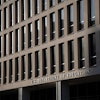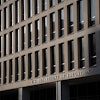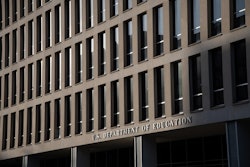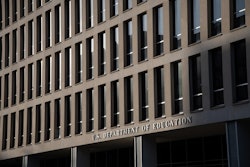Academics and Athletics: Playing for the Same Team
High expectations greeted Dr. Myles Brand when he became president of the National Collegiate Athletic Association (NCAA) in January 2003. As the fourth president of the nation’s most powerful  amateur sports organization, Brand has the distinction of being the first to have been a college president. As president of Indiana University, the veteran administrator gained national attention in 2000 for firing the controversial Indiana University-Bloomington basketball coach Bobby Knight over professional misconduct. A few months after the Knight firing, Brand urged broad reforms of college athletics during a highly regarded speech at the National Press Club in Washington, D.C. That speech later proved instrumental in helping position Brand at the top of the NCAA presidential candidate list during a seven-month search in 2002. “Reform and advocacy are the dual guideposts to our future success,” he declared in the annual NCAA address shortly after taking office at the NCAA headquarters in Indianapolis. With those words and more, Brand has sent the message that the NCAA is committed more than ever to the academic success of student-athletes in American higher education. This month, the NCAA board is expected to approve an “incentives/disincentives” plan designed to bolster graduation rates by holding individual colleges and universities responsible for the academic performance of its student-athletes.
amateur sports organization, Brand has the distinction of being the first to have been a college president. As president of Indiana University, the veteran administrator gained national attention in 2000 for firing the controversial Indiana University-Bloomington basketball coach Bobby Knight over professional misconduct. A few months after the Knight firing, Brand urged broad reforms of college athletics during a highly regarded speech at the National Press Club in Washington, D.C. That speech later proved instrumental in helping position Brand at the top of the NCAA presidential candidate list during a seven-month search in 2002. “Reform and advocacy are the dual guideposts to our future success,” he declared in the annual NCAA address shortly after taking office at the NCAA headquarters in Indianapolis. With those words and more, Brand has sent the message that the NCAA is committed more than ever to the academic success of student-athletes in American higher education. This month, the NCAA board is expected to approve an “incentives/disincentives” plan designed to bolster graduation rates by holding individual colleges and universities responsible for the academic performance of its student-athletes.
To carry out reforms that put academics first and foremost, Brand, whose NCAA contract runs through 2007, draws upon his long career that spans from the Indiana and University of Oregon presidencies to his early days as a philosophy professor. He has also served as chairman of the board of the Association of American Universities. In late March just as the NCAA college basketball tournaments were getting under way, Black Issues spoke to Brand about the leadership challenges he faces.
BI: How would you describe the progress, or lack of it, on reform and advocacy, the two principles you outlined in your first annual address as NCAA president as your top priorities?
 MB: I think we’re making excellent progress on academic reform. What we really want to do is have student-athletes who have the full opportunity to get an education at our fine colleges and universities. And we already have in place higher standards for initial and continuing eligibility. For example, what we’ve done is raised the required number of core academic courses necessary to be eligible to play as a freshman, and we’ve put less emphasis on the SAT scores. …
MB: I think we’re making excellent progress on academic reform. What we really want to do is have student-athletes who have the full opportunity to get an education at our fine colleges and universities. And we already have in place higher standards for initial and continuing eligibility. For example, what we’ve done is raised the required number of core academic courses necessary to be eligible to play as a freshman, and we’ve put less emphasis on the SAT scores. …
In addition, when a student-athlete comes to our campuses, we want to make sure that they have every opportunity to graduate. That means taking a curriculum that is going to lead over time — five years — to graduation. And so we’re requiring that a student-athlete make 20 percent progress each year toward a degree. That’s a higher level of requirement than in the past, which only focused on the number of courses one would take, not actually making progress toward the degree.
We’ve raised both the initial continuing eligibility standards and the result of that is going to be, I think, better-prepared students coming to our colleges and students more likely to graduate.
I’m not worried about the Lebron James’ of the world. Those prodigies — multimillionaires — will be successful. I am very worried about the thousands and thousands of others who look forward to the opportunity both to participate in basketball, and if they don’t make the pros, get an education. …
So (the) initial continuing eligibility piece for academic reform has already been put in place. The next step, the key step is going to take place this April when we have an “incentives/disincentives” program. If you can think of the eligibility standards as holding the student-athlete accountable, then the incentive/disincentive program holds the program and the school accountable. In other words, if a basketball program doesn’t graduate at a certain level compared to the other students at the institution, then they will be warned. And if that doesn’t work, maybe take away some scholarships. If that doesn’t work, that could prevent them from playing in the postseason NCAA (tournament for) basketball. There’s been even some discussion of even more severe penalties like (suspending) the program. But the point is we have to hold the teams, the athletic department and the school accountable for academic performance of the student-athletes.
Now the advocacy issue that you speak about is more difficult. We’ve seen over this past year coaches, programs, student-athletes, even presidents who are frankly misbehaving. Some of the misbehavior has been scandalous. And as a result, it’s very difficult to advocate for college sports when all those mishaps are getting a great deal of publicity. Nonetheless, I think we’re doing better and better clarifying the nature of the college game, saying what’s special about collegiate athletics — that it involves student-athletes, not paid professionals, and that the way we want to make sure the future of college sports is sound is to ensure that it has a collegiate look to it, that it’s really college sports at its best and not third-rate professional sports.
BI: How do you think having been a college president, an academic dean, faculty member and scholar has helped you in your current position?
MB: I think the academic experience, most especially having been president of two universities, (the University of) Oregon and Indiana University, has given me the sense of the role of intercollegiate athletics within the academic enterprise. It’s given me firsthand experience and knowledge about what we can expect of student-athletes and what we can expect of athletic programs. It gives me a comfort level of understanding the academic enterprise that others who come through the athletic track may not have achieved.
On the other hand, it makes me work doubly hard to learn the athletic side of the house, which is not as well known to me as to many others.
BI: Why do you think we haven’t seen more Blacks hired as head coaches of Division I-A football teams?














